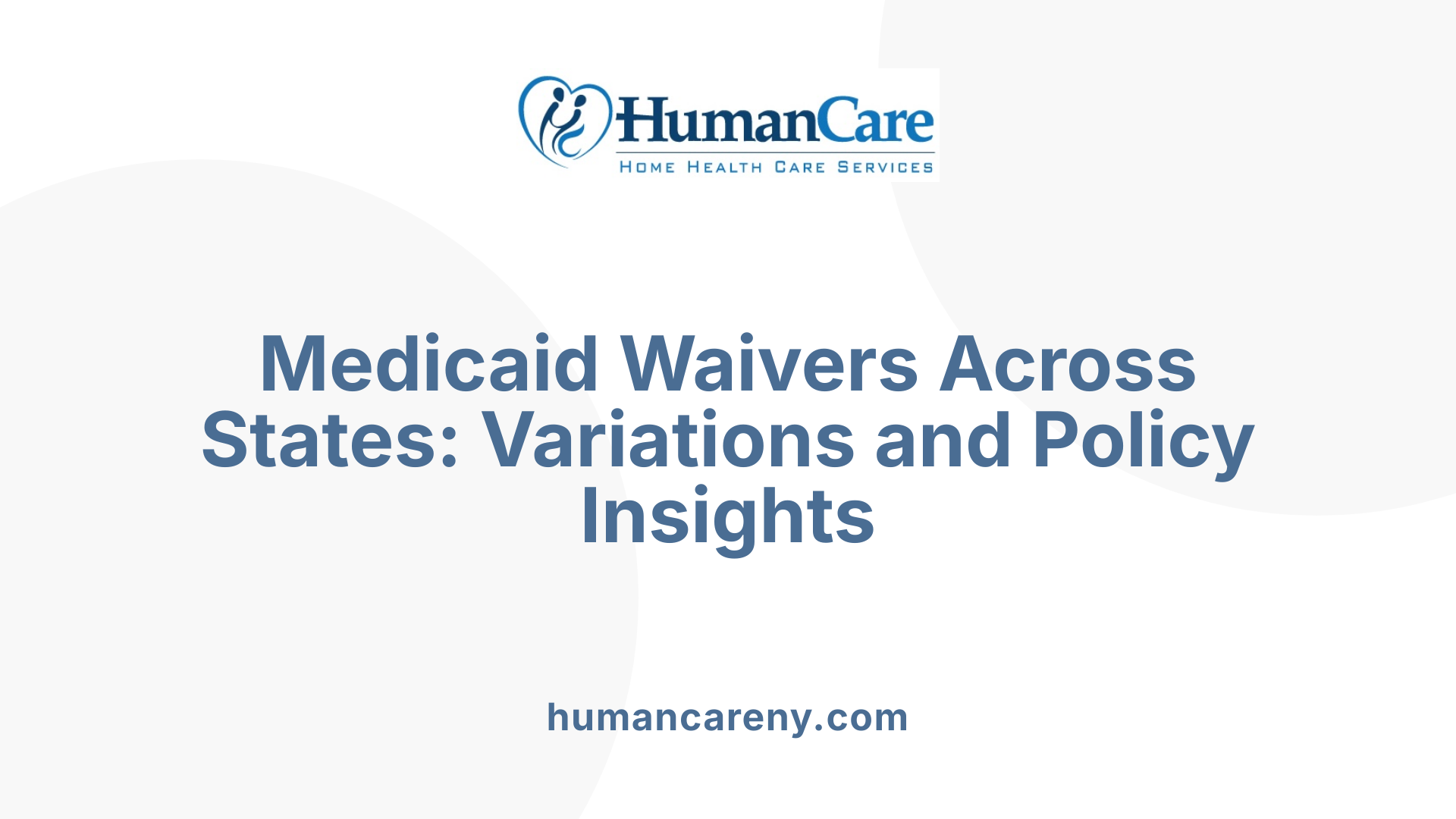Introduction to Medicaid Waivers and Their Significance
Medicaid waiver programs are pivotal tools that allow states to tailor their Medicaid services to meet the unique needs of their populations, especially for individuals requiring long-term care in community settings. These waivers provide states with the flexibility to develop innovative, person-centered approaches, thereby enhancing access, improving health outcomes, and promoting independence among beneficiaries. Understanding how case management operates within these waivers is essential to grasping how individuals receive appropriate services that enable them to live safely and comfortably in their communities.
The Spectrum and Purpose of Medicaid Waivers
 Medicaid waivers represent a critical component of the healthcare system, allowing states to tailor their Medicaid programs to better serve their populations. These waivers are special permissions granted by the federal government that enable states to deviate from standard Medicaid rules, fostering innovation and flexibility.
Medicaid waivers represent a critical component of the healthcare system, allowing states to tailor their Medicaid programs to better serve their populations. These waivers are special permissions granted by the federal government that enable states to deviate from standard Medicaid rules, fostering innovation and flexibility.
There are multiple types of Medicaid waivers, each designed for specific goals. Section 1915(c) waivers are primarily used to offer home and community-based services (HCBS), which help individuals receive long-term care outside institutional settings like nursing homes. These waivers support a broad range of health and social services, including personal care, respite, and assistive technologies, aimed at promoting independence.
Section 1915(b) waivers focus on managed care and service delivery restrictions, such as limiting provider networks to control costs and ensure quality care. Broadly, Section 1115 waivers are used for experimental and innovative programs that test new approaches to Medicaid delivery, often spanning multiple services and populations.
Federal oversight ensures that these waivers adhere to core principles like cost neutrality and program integrity. While each waiver type offers flexibility, they must comply with budget and quality standards, ensuring taxpayer funds are used effectively.
Overall, Medicaid waivers empower states to design programs that are more responsive to local needs, whether by expanding access, improving care coordination, or introducing innovative services. This adaptability is vital for addressing diverse population health challenges while maintaining federal accountability.
Additional Information:
| Waiver Type | Primary Focus | Example Services | Oversight & Requirements |
|---|---|---|---|
| 1915(c) | Home and Community-Based Services | Personal care, respite, assistive tech | CMS approval every 5 years for renewal |
| 1915(b) | Managed Care & Service Restrictions | Care coordination, provider networks | Budget neutrality, federal approval |
| 1115 | Experimental & Broader Projects | New care models, population-specific programs | Must demonstrate cost neutrality & innovation |
Medicaid waivers have revolutionized long-term care and service delivery, offering tailored solutions that help individuals thrive in community settings while allowing states to innovate within federal guidelines.
Eligibility and Application Processes within Medicaid Waivers

What are the eligibility criteria for Medicaid waiver programs?
To qualify for Medicaid waiver programs, individuals must meet several requirements. Primarily, applicants need to demonstrate a Level of Care comparable to that provided in a nursing home, meaning they require assistance with daily activities due to medical or functional needs. This includes needing some form of medical observation, assistance with severe medical conditions, or support from medical equipment.
Financially, applicants must meet income and asset thresholds set by the state, which typically align with Medicaid guidelines. Most states limit income to a certain percentage of the federal maximum, often around 300% of the Supplemental Security Income (SSI) rate. In addition, applicants must reside in or be transitioning into an HCBS-compatible setting, demonstrating enough stability to support community living.
Services covered can include personal care, home modifications, durable medical equipment, and emergency response systems, tailored to individual needs. Other criteria include being aged, blind, disabled, or suffering from specific medical conditions requiring long-term support. To confirm eligibility, individuals are advised to consult their state Medicaid office, which can clarify specific criteria and service options.
Services and Support Structures in Medicaid Waiver Programs

What services are included in Medicaid waivers and case management?
Medicaid waivers offer a broad spectrum of services aimed at supporting individuals to live independently within their community. These services include health-related supports like skilled nursing, therapies, pharmacy management, and medical equipment. They also encompass social and personal care services such as personal assistance, homemaker services, adult day programs, respite care, and home modifications.
Case management is an essential part of these programs, providing assistance in developing and coordinating service plans. The case managers evaluate individual needs, facilitate access to services, and ensure that support plans are regularly reviewed and adjusted. Other offered services can include meal deliveries, transportation, behavioral health supports, and minor home improvements that improve safety.
The primary goal of these diverse services is to prevent unnecessary institutional placement, such as nursing home admission, by furnishing participant-centered, flexible care in familiar settings. Each participant’s plan is tailored to their specific needs, fostering independence and community participation.
How are Medicaid waiver case management services structured and organized?
Medicaid waiver case management is organized under federal guidelines, mainly via 1915(c) Home and Community-Based Services waivers, and sometimes through targeted case management under the Medicaid state plan. These services are provided by specialized agencies trained to coordinate care effectively.
The organization involves dedicated case managers who perform assessments, develop personalized care plans, and coordinate service delivery. They serve as the central point for navigating various providers and ensuring the participant receives all necessary supports. To prevent conflicts of interest, regulations stipulate that case managers cannot provide other waiver services for the same individual.
States have considerable flexibility in structuring these services. They define qualifications for case managers, determine caseload sizes, and select whether services are delivered through managed care entities or independently contracted providers. Ongoing monitoring and regular face-to-face contacts—such as quarterly reviews—are mandated to ensure quality care.
Overall, the system aims to create a seamless, person-centered support network that adapts over time to meet changing needs, aligning with federal standards and state-specific goals. This structured approach helps maximize the effectiveness of services and supports individual independence and community engagement.
State Variations and Policy Considerations in Medicaid Waivers

Are there variations in Medicaid waiver programs across different states?
Yes, Medicaid waiver programs vary considerably from state to state. Each state designs its waivers to meet local needs and priorities within the federal framework. For example, some states operate multiple types of waivers such as Section 1915(c), 1915(b), or 1115, each serving different goals like expanding home and community-based services, testing innovative models, or modifying eligibility rules.
The services offered, eligibility criteria, provider standards, and even the target populations can differ widely. Certain states may prioritize services for individuals with developmental disabilities, the elderly, or those with traumatic brain injuries, while others might focus on broader populations.
Approval processes and activity levels for specific waivers also vary. Some states have active waivers with extensive programs, while others maintain only a few or have program caps and waiting lists. This variation allows states to customize Medicaid services according to their unique health system infrastructure and community needs.
Overall, although federal regulations set broad guidelines, state-level implementation leads to a diverse landscape of Medicaid waiver programs nationwide.
What policies govern Medicaid waiver case management?
Medicaid waiver case management is primarily governed by federal guidelines established under the Home and Community-Based Services (HCBS) waivers. The Centers for Medicare & Medicaid Services (CMS) oversee these policies to ensure all programs are efficient, effective, and safeguard participant well-being.
Key policy requirements include demonstrating that waiver services are cost-effective compared to institutional care and providing protections for participants' health and safety. The development of individualized, person-centered care plans is central to state policies, with case managers playing a crucial role in identifying needs, coordinating services, and monitoring ongoing care.
States can request waivers to modify or waive certain Medicaid statutory requirements, such as the need for statewide coverage, service comparability across populations, or income/resources rules. These waivers allow states to tailor services, expand access, and implement innovative approaches.
Case management processes are subject to specific standards, including provider qualifications, oversight, documentation, and quality monitoring. For example, Colorado recently adopted policies to streamline case management activities, emphasizing efficiency and clarity. The renewal cycle for these waivers generally occurs every five years, during which CMS reviews compliance to standards and program effectiveness.
In summary, Medicaid waiver case management policies balance flexibility for states with federal oversight to ensure that services are high quality, person-centered, and financially sustainable.
Outcomes, Challenges, and Future Directions of Medicaid Waivers
Participation in Medicaid waiver case management has demonstrated substantial benefits for individuals receiving long-term care services. These programs facilitate personalized, person-centered planning, allowing individuals to stay in their homes or community settings rather than institutional facilities. By coordinating services such as habilitation, behavioral support, medical equipment, and home modifications, case management improves health outcomes and promotes greater independence. Participants often experience enhanced quality of life, benefiting from services like respite care, transportation, and homemaker assistance, which support community integration and autonomy.
The impact of these programs extends beyond individual well-being. Effective case management helps prevent premature or unnecessary institutionalization, leading to cost savings for Medicaid and other stakeholders. Overall, individuals enjoy more control over their care and lives, fostering community engagement and social participation.
However, Medicaid waivers and case management face notable challenges that could influence their future development. For instance, policies such as work requirements have resulted in significant disenrollment, especially for vulnerable groups. In states like Arkansas, these restrictions have limited access to necessary services, raising concerns about equity and fairness.
Moreover, the inconsistent implementation and strict eligibility criteria across states create disparities in care access. The ongoing debates surrounding work requirements and other restrictive policies, especially following the Biden administration’s decision to withdraw such waivers, highlight the contentious nature of Medicaid program reforms.
Looking ahead, establishing standardized national eligibility and benefit frameworks could help reduce disparities and improve program stability. Addressing systemic flaws, such as administrative complexities and limited provider networks, is essential. Policymakers must also balance enforcement with public health and ethical considerations, ensuring that individuals do not lose vital services due to policy shifts. Moving forward, a focus on evidence-based reforms and preserving the core aim of Medicaid—supporting vulnerable populations to thrive in community settings—will be crucial for the sustainability of waiver programs.
Final Thoughts: The Critical Role of Case Management in Medicaid Waivers
Medicaid waiver programs are essential in shaping the future of community-based long-term care, offering flexibility, innovation, and person-centered services. Case management serves as the backbone of these programs, ensuring that individuals receive tailored, coordinated support that aligns with their specific needs and preferences. While variations across states highlight the customizable nature of these waivers, the core principles remain consistent: improving quality of life, promoting independence, and reducing reliance on costly institutional care. Addressing ongoing challenges and future policy considerations will be key to sustaining and expanding the benefits of Medicaid waivers, reaffirming their vital role in healthcare systems dedicated to serving vulnerable populations.
References
- Home & Community-Based Services 1915(c) - Medicaid
- Indiana Medicaid: Members: Aged and Disabled Waiver
- Medicaid Waiver Program Types
- Indiana's Medicaid Waiver Programs: Home and Community-Based ...
- Waiver Services (Sections 21 and 29) - Maine.gov
- Medicaid Waivers & How They Help Seniors Live at Home
- Home- and Community-Based Services - CMS
- Ohio Home Care Waiver - Ohio Department of Medicaid



